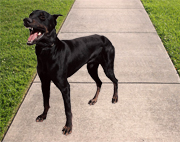Posts Tagged ‘Massachusetts dog bite lawyers’
Dog Bites and Dog Attacks Can Be Prevented
 With the return of the warm weather, many dogs are back outside with their owners in our neighborhoods, parks and yards.
With the return of the warm weather, many dogs are back outside with their owners in our neighborhoods, parks and yards.
This is the time of year dog bites often occur, as dogs encounter unfamiliar people and environments. Dog bite injuries can result when dogs are not properly trained, do not receive the right care and are not prepared for social interaction.
May 20 to May 26 is National Dog Bite Prevention Week, hosted by the American Veterinary Medical Association (AVMA). One of the organization’s messages is that dog bites and dog attacks are preventable if owners take the right steps to train their pets.
Children are the most frequent dog bite injury victims. Of 800,000 Americans who receive medical attention for dog bites each year, approximately half are children. In 50 percent of dog bite cases involving children, the dog responsible belongs to a neighbor.
Senior citizens are the second most common dog bite victims. On the job, more than 5,600 postal workers are attacked by dogs each year.
If you own a dog or plan to obtain one, you have a responsibility to practice safe ownership and protect others from dog bites and dog attacks. Our Boston dog bite lawyers offer you these safety tips:
- Make sure your dog is licensed and has received all of its vaccinations. These are your most basic responsibilities.
- Always use a leash when walking your dog. This is a courtesy to other people you encounter and helps protect everyone.
- Select your dog carefully and take time to research the breed. If it is a puppy, ask to meet the parent dogs. Never obtain a dog on impulse.
- Make sure your dog is always wearing its tags with appropriate identification information.
- Ask your veterinarian if they suggest a dog training school. If you choose to use one, do your research. Seek out references online and ask the dog school owner for client names.
- Train your dog to know basic commands such as “sit,” “stay,” and other actions. This builds a bond of trust between your dog and people
- Ask your veterinarian or dog trainer whether crate training may be appropriate
- Make sure your dog has opportunity for healthy interaction with other people and animals as a puppy. According to the AMVA, the first 6 to 14 weeks are critical to a puppy’s social development. The challenge is this is the time when a puppy is most vulnerable to illness so it is important to work with your veterinarian.
- Do not put your dog in a position where it feels threatened or teased.
- Make your home a safe environment for yourself, your dog, guests and neighbors. Consider fencing your yard. Make sure you have a door partition and a crate. Also make sure there are not any door or window openings which allow your dog to exit your home on its own.
- Your dog needs physical exercise and mental stimulation. Make time in your schedule to regularly walk and exercise your dog.
- Dogs can become bored and potentially destructive when left alone for many hours at a time. If yours is left alone all week, consider dog walking or daycare services for parts of the week.
- Avoid high-excitement games with your dog, such as wrestling.
- If your dog is showing signs of aggression, talk to your veterinarian and a dog trainer. If your dog bites or attacks someone, the injuries may be severe and long-term. You may also be held liable and have to pay damages.
Tips from Dog Bite Prevention Week to Help Keep Massachusetts Residents Safe
While dogs have long been considered “man’s best friend,” the sad fact is that approximately 4.5 million people suffer from dog bites each year. About one in five of those bitten require medical attention for personal injury. Even seemingly friendly, mild-tempered canines can suddenly become agitated in certain situations or with certain individuals. However, there are actions you can take to decrease the odds of a serious dog bite.
Tips for Dog Owners:
- Don’t allow your dog to roam outside without a leash.
- Spay or neuter your pet.
- Never leave your dog unattended with a young child or baby.
- Don’t play rough/aggressive games with your pup. This can inadvertently teach aggressive behaviors.
- Plan social activities into your pet’s schedule–like walks in the park or dog play groups.
- If your pet does develop aggressive behavior, seek professional advice immediately from a veterinarian or trainer.
Tips for Interacting with Dogs:
- Don’t attempt to pet a dog through its fence; seemingly friendly dogs are often territorial.
- Always ask the owner before reaching to pet any canine.
- If you meet an unattended dog, do not shout or run.
- If the dog approaches you, avoid eye contact and remain motionless until the dog passes by.
- Do not approach a dog that is eating, chewing a bone, or sleeping.
- Teach your children appropriate dog interaction skills.
Massachusetts has laws that make dog owners strictly liable for injuries caused by their dogs, as long as the person who was bitten was not teasing, tormenting or abusing the dog, or not trespassing at the time of the bite. Ordinarily, these injuries are covered by insurance, although some insurance companies have begun to limit coverage for certain breeds of dog. If you are a dog owner, you should make sure injuries by your pet are covered.

